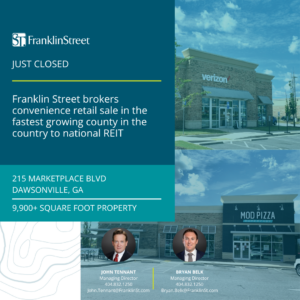As a commercial real estate agent you’re likely aware that there are three types of firms that dominate the industry: 1. National/global. 2. Regional. 3. Boutique/local. Each type has its own pros and cons. Consolidation has been accelerating in the industry in recent years as more firms continue to acquire or merge with other players. In fact, regional firms that are committed to staying independent have become a rare breed in our field. This differentiation is only going to grow larger over time.
But whether you specialize in investment sales or leasing, all producers should know that regional firms can often be exceptional employers. Here are three important factors to consider when deciding if working for a mid-size brokerage such as Franklin Street will suit you best.
1. Less competition within your specialty. There is one thing that all commission-based producers have in common no matter what product type they specialize in. Ultimately, they each benefit the most financially by aligning themselves with a real estate firm that is not oversaturated with brokers in their space. For example, a national firm in a major market may have multiple brokers and teams competing in the same business line and product type. This situation creates a high level of in-house competition for the same clients in that market, often leading to an adversarial culture within the office. However, a regional firm is more likely to create a synergistic approach with less brokers assigned to the same space. Those producers have more “room to run” in the market and are much more likely to collaborate and work as a team within the office.
2. Regional does not mean “no deals on a national basis.” It is a common misconception that being a producer at a regional firm limits the ability to broaden client relationships into multiple markets as an overall account. On the contrary, not only can regional brokers arrange transactions in multiple markets, but they also benefit from being able to work with the best brokers from any firm on cross-market deals. National firms often hamstring their brokers by requiring them to partner with only their own company, even when those colleagues may not be the best option for the client in that particular market. At Franklin Street, for example, we have taken over accounts in Florida from national firms because the client was frustrated with junior level brokerage experience being placed on their deals in the local market. Not only do we put top level producers on each Florida deal, but when the client has needs in the Midwest or West Coast, we are free to partner with the best brokers on the ground in those markets regardless of the firm.
3. Resources of a national company but with advantages of a privately-owned firm. One of the major advantages that national and regional firms have over a boutique agency is the level of resources available to their brokers. Regionals, in the markets they cover, frequently offer the same full platform of services and back-office support that a broker would get from a national brokerage. This gives producers the ability to offer their clients multiple solutions across related business lines such as property management, commercial insurance, project management and others. While national firms do have a wide variety of resources, many producers prefer to tap into a similar platform at the regional level while gaining greater incentive-based pay packages and faster career progression.
On the other hand, local boutique firms may sometimes offer larger commission splits than other brokerages, but they are much more limited in the scope of business services they can provide to clients. In addition, while regional firms are “invited to the dance” along with the nationals in formal RFP scenarios, boutiques are often left out of the bidding process for major accounts by clients who are more comfortable dealing only with a recognizable brand.
ABOUT THE AUTHOR
With over 20 years of experience, Kurt Keaton is responsible for the overall management and operations of Franklin Street Real Estate Services and Franklin Street Management Services. As the President of these divisions, he leads a client-centric team bringing together expertise in investment sales, tenant representation, landlord representation, property management, and project management. He drives the firm’s business strategy for these services across office, industrial, retail, multifamily, and mixed-use product types in alignment with Franklin Street’s core values—Collaboration, Integrity, Hard Work, and Accountability. Prior to Franklin Street, Mr. Keaton served 16 years as Managing Director for Jones Lang LaSalle (JLL), where he was responsible for delivering the national investor suite platform to owner clients across the U.S. He can be reached at [email protected].



